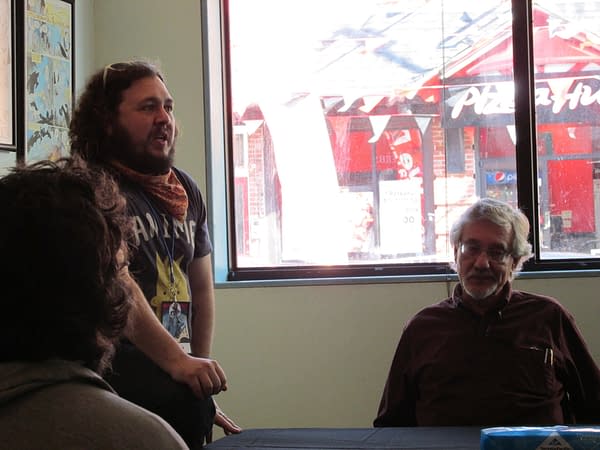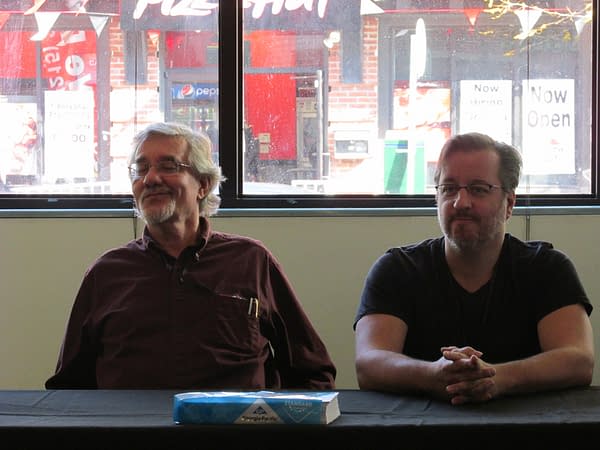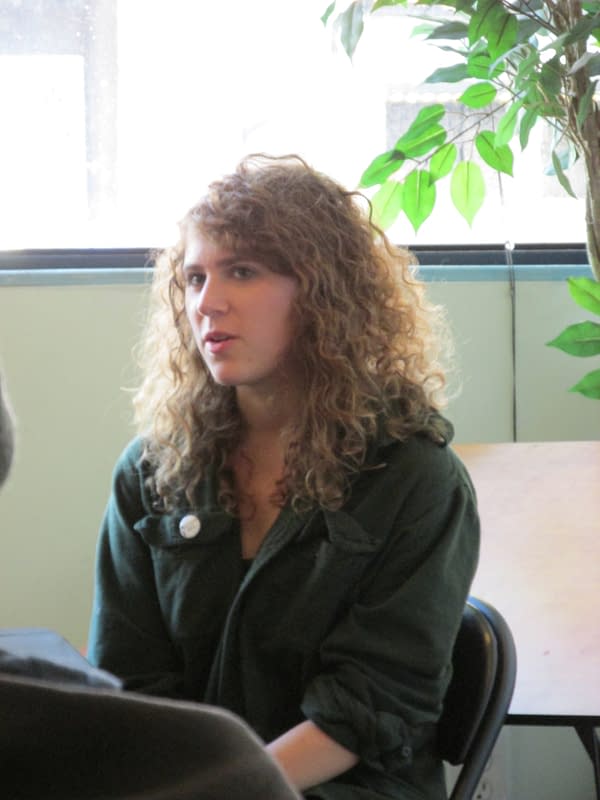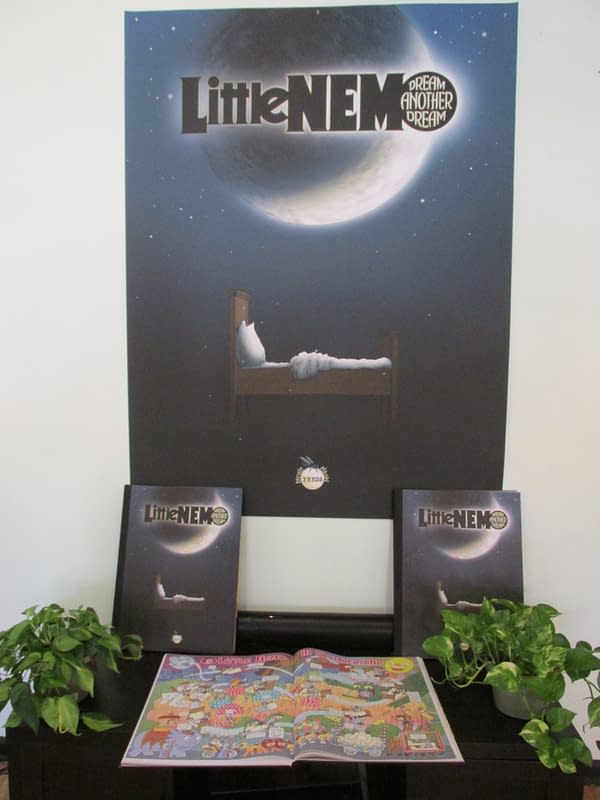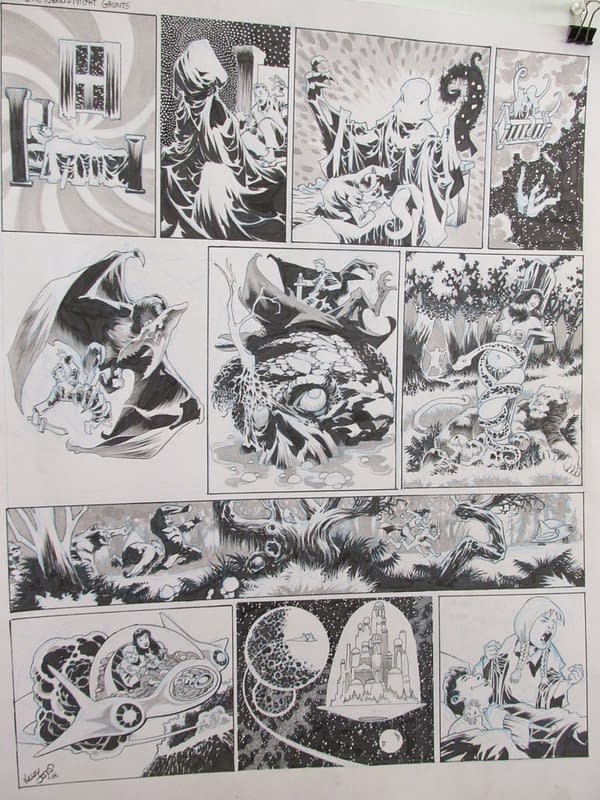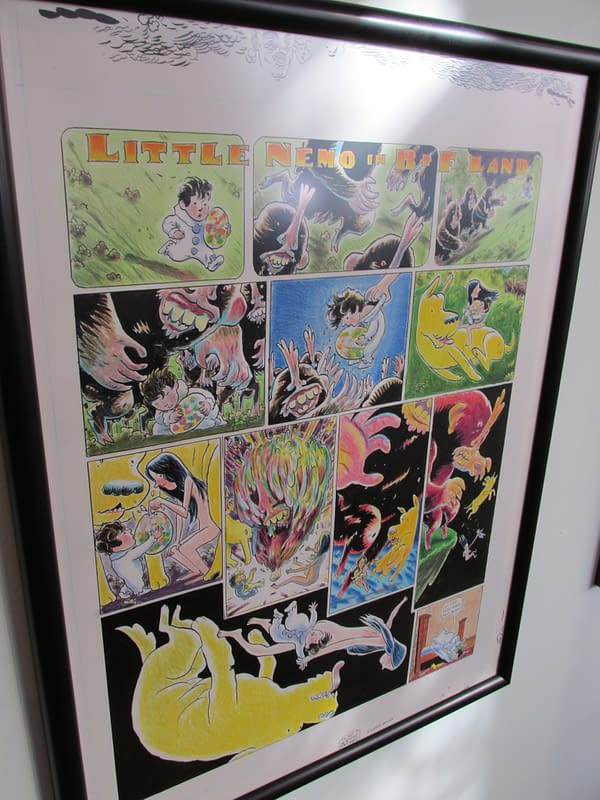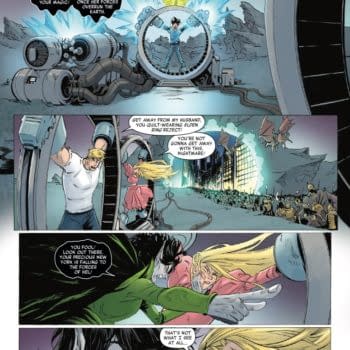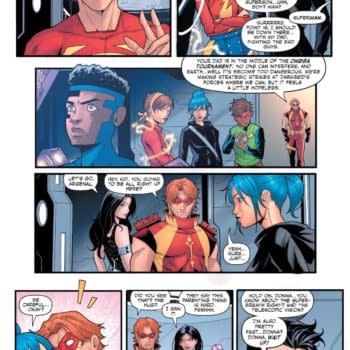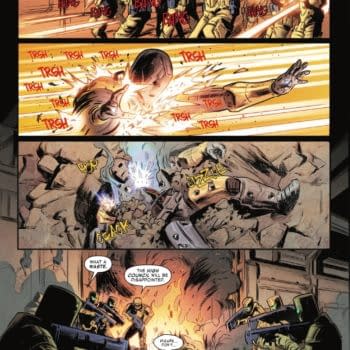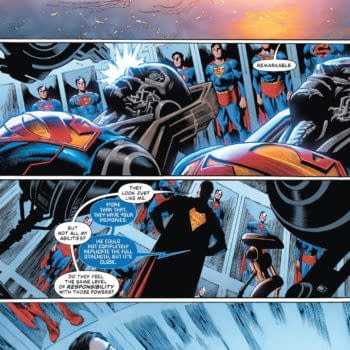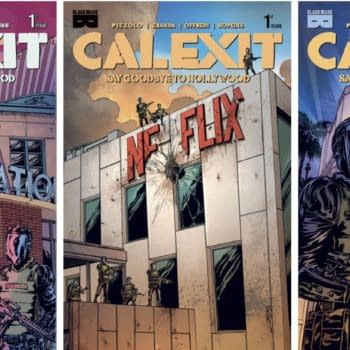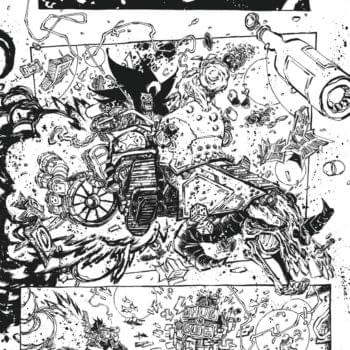Posted in: Comics | Tagged: Box Brown, Breaking Into Comics, Comics, Daryl Seitchik, dean haspiel, Denis Kitchen, entertainment, indie Comics, Little Nemo: Dream Another Dream, Locust Moon Comics, Locust Moon Comics Festival
Breaking In And Staying In: A "Career" In Comics With Denis Kitchen, Box Brown, Dean Haspiel, Daryl Seitchik At The Locust Moon Comics Festival
Attending the Locust Moon Comic Festival, now in its third year, I also headed along to catch the "Breaking In and Staying In: A "Career" in Comics" panel with Denis Kitchen, Box Brown, Dean Haspiel, Daryl Seitchik held at Locust Moon Comics. A parade of chalk drawings led the way between the shop and the Rotunda where exhibitors had decamped on a sunny Saturday to celebrate comics in Philadelphia. The walls of the meeting room at the comic shop were festooned with the intricate, large-scale artwork that contributed to the massive Kickstarted volume Little Nemo: Dream Another Dream being launched to the public the same evening.
Box Brown introduced himself as founder of Retrofit Comics in 2011, and author of New York Times Best-seller Andre the Giant. He pointed out that there's some kind of "generation gap" right now in comics, and this whole notion of "breaking into comics" pertains to that.
He was joined by Daryl Seitchik, who is relatively new to the comics scene but has a series "Missy" on Tumblr and has works at Oily Comics. Brown introduced Dean Haspiel as having worked with "some guy" named Harvey Pekar and having worked with nearly every publisher. Denis Kitchen, publisher, editor, art collector, cartoonist, and an "entrepreneur", was introduced as well.
Brown hoped to "foster a discussion" among three generations of cartoonists, he said, with Seitchik at the end of one spectrum and Kitchen at the other. Seitchik was an English major originally, and unhappy pursuing that, and discovered graphic novels in the library, like the works of Gabrielle Bell, who she later worked with as a colorist.
Haspiel pointed out that Seitchik's work on Tumblr already illustrates the generation gap between the panelists. Brown and Haspiel observed how new the Tumblr phenomenon is and that it certainly hasn't been around long. Haspiel recalls buying comics off the news stand, and then finding stuff at comic shops was an extension of that. Having decided at age 12 to be a cartoonist penciling The Fantastic Four and he observed that now you don't have to have even read Marvel or DC comics to want to be a cartoonist, and that's a new thing.
Denis Kitchen's interest in comics long pre-dates the rise of comic shops. Coming of age, he said, in the 50's and 60's, his interest started with newspaper comic strips. Comic books he'd find on racks at the "drug store" and he "never dreamed we'd have the kind of diversity we have now" and he worked on "smart swapping". Lots of friends read superheroes, but he was interested in Little Lulu and others and could get 3 of those for one superhero comics. He thought he was getting a deal.
Haspiel added that being on LiveJournal in 2006, he noticed cartoonists putting comics on line, and wondered why people weren't more organized about it, which led to him founding the webcomics platform ACTIVATE. He had to "convince" a number of cartoonists to post for free. He knew that was "the trick", to show up on time and create a "24 hour resume" of your works. Brown recalls noticing the launch of ACTIVATE in 2006 and thinking, "These guys are taking this super seriously" unlike others.
Brown felt like back in 2006, there was a real divide between the print cartoonists and the web cartoonists, a divide that no longer exists. Seitchik agreed, since many of the people who post on Tumblr or online are being published by indie publishers in print. Haspiel joked that there's still a divide between opening up a laptop and using an ipad, meaning there will always been causes of divisive choices.
Brown asked how Kitchen felt when he saw people putting things online for free, and he said he observed it to be very smart as a form of "getting out there" and "branding yourself". His great role model for this is Will Eisner, who offered to do comics for free for a couple of installments to show that there was an audience for his work.
When Brown was getting started in 2005, he envisioned himself doing a newspaper strip for an indie newspaper, and he asked Seitchik if that had ever been a goal. She said that she has always envisioned working in a coffee shop her whole life and hopefully self-publishing. Haspiel said nowadays, people think more of doing comics "on the side" and earlier on, people wanted to do cartooning as their job.
Brown cited James Kolchaka, who has said that it's not that hard to get into comics, but it's hard to stay in. Haspiel added that Kolchaka did a daily comic for years to get where he is now. Haspiel works 7 days a week just to get the money to hand it over to the landlord, and not have health insurance or any other safety nets, just to stay in comics. He doesn't have anything that makes money "while he sleeps" and recently made 41 dollars of royalties on several works he's done for them, combined. It's the most "unprofessional profession" in the world, Haspiel laughed.
Brown looked at the work for Little Nemo spread over the walls of the meeting room, and pointed out the impracticality of this beautiful art to make money. Haspiel observed the need for short cuts and resisting "over rendering" when you're having to work so hard and so fast. Haspiel has "hustled a lot" working a ton of part time gigs, he said, and though he has achieved his dream of drawing the Fantastic Four, now it's on to his own characters.
Denis Kitchen also spent his own time "starving" and didn't think about money as much until he was married and had a child, and that's when he became a publisher, where he could count on getting a "little piece" of every project. He has always tried to be "transparent" with artists and give accounting for art and funds, all the things he didn't see happening in comics at the time. By setting up a fair company, he attracted Crumb and Eisner and Kurtzman, etc. and was able to be more successful than his counterparts, he said. Though he has always thought of himself as an artist at heart.
Kitchen still thinks of himself primarily as an artist, and looking at his own Little Nemo piece on the wall spoke of how proud he is of it, and there's a connection between the mind and the "fingertips" that can't happen in any other way.
Brown asked about Kitchen's print runs in the early days of Kitchen Sink Press and Kitchen said the minimum run was 10,000 and Robert Crumb was 50,000. They sold through head shops, a "captive audience of stoners". In the context of a generation with fewer choices with few TV channels and no internet, there was little in the way of entertainment. For 50 cents they could read a comic with friends. Their demand exceeded their supply, Kitchen said.
As a publisher himself, Brown said, their biggest run has been 2,000, and that has seemed substantial to him. Brown said that these days, if you want smaller numbers printed, you can still get a pretty nice book printed, whereas back then, you needed 10,000 to start with to make a deal. Kitchen commented that even 10,000 was nothing compared to Marvel and DC back then.
Tumblr reaches such huge numbers that there's no comparison, but that's not necessarily monetized. Haspiel feels like the internet has leveled the playing field in gaining attention. It's an "infinite niche" and becomes a "blur", Brown and Haspiel agreed, creating new problems. Brown asked what methods are being used today to market one's work.
Kitchen said he doesn't Tweet and isn't on Tumblr and there are things he might do, but he doesn't have much time. Kitchen Sink Books was revived a year ago as an imprint of Dark Horse and gets to focus on the technical and design side whereas Dark Horse does the shipping and such. Haspiel is on Facebook, takes off his clothes and hopes for the best, he joked. He realizes that social network is "curated" and it piggy-backs on each other among communities of creators. When he posts others work on his Facebook page, it creates a curatorial sense that appeals to his Facebook followers. It allows him to spend time saying what he DOES like versus spending time on what he doesn't like. Seitchik said that she doesn't actually do very much, and that the problem is that even really good works gets ignored and overwhelmed in that venue, so she's started doing many shows, 16 shows in 4 years, which have really helped her gain a following. Part of being a cartoonist today is about getting involved in shows, Brown said.
Haspiel agreed it's important, but he doesn't do as many shows as he should, though "throw a stone" and you'll find a comic con these days. Brown went to his first New York Comic Con this year, and found it "very crazy" as a sea of people, a "literal sea". Shows are a big part of gaining followings now, he agreed.
Brown asked if Seitchik has an idea of "breaking in" and she said "no", perhaps the day she "made back her table money" for the first time at a show. People on Tumblr, even with a big following, aren't really making their living doing it. Even Michael Deforge works as a storyboarder, she said. Once upon a time, people had to "break in", Brown said, but now you're "wading out into a gelatinous" zone. Haspiel added that there is a pattern of putting stuff online, then getting an Image book, then going to Marvel and DC, and then they "split" and go back to creator-owned, perhaps at Image. There have been the sudden breakaway successes like Kate Beaton on Hark! A Vagrant, however.
Brown said that he thinks the idea of making comics and also having another job is a "fully suitable" thing to do. It's not a case of not really being "in" comics if you do that. It doesn't matter any more to be a "professional" in the sense of being paid. Haspiel feels a cartoonist who "shows up to the party regularly" meaning "your own party" making your own comics. It "became trendy" to be a cartoonist, more recently, Haspiel said, and it didn't used to be cool. He used to "get made fun of" when he said he wanted to make comics. Brown was influenced by being told comics were uncool in high school and dropped them for awhile, he said, out of a desire to fit in.
Brown asked if there's been a change in the "discourse" about comics over recent years. Haspiel said that when the New Yorker and the New York Times "sanctioned comics", that was a big deal. Kitchen said there were no fanzines in his day and they were crude if they existed, so "you didn't look for feedback" and there were no reviews. It was all "word of mouth". Now, there are "serious historians at universities" who talk about comics and like anything else in acadmia, it can "get a little dry". He recalls not being able to get any information on Little Nemo back then and there "wasn't much" on the history of comics at all.
Brown asked how the panelists feel seeing fan feedback and reviews of works, a constant flood of opinions online. Haspiel said that part of creating ACTIVATE was to "life the veil" between creators and readers. Now he feels a little differently and just wants to see the "thing for what it is". He put a process piece on display for Cuba: My Revolution, he recalls in a gallery, and the Red Hook paper did a review saying they didn't understand why comic art should hang on the wall. Haspiel could see that point, but actually found them on Facebook, befriended them, and it led to them trying to pursue comics from fine art.
Kitchen says he hasn't had to face critics much, doesn't go out of his way to do so, and he'd rather have someone be "objective" about the work. Seitchik, however, just knows almost everyone who has reviewed her work. People tend to look at "likes" and comments instead. Haspiel said that there does need to be dialogue, and he looks for sites like Bleeding Cool and Comic Book Resources to see what people are saying. Brown asked if the point of writing online is to provoke controversy, and Haspiel agreed that he's seen many people do that, and doesn't mind it so long as it's "honest" in its inception.
And audience member asked if the panelists sell original art as a revenue stream, and Haspiel doesn't much, since he's particularly attached, and Seitchik does still use pen and paper, though she edits digitally, so for these two, there is "original art" to sell. Kitchen pointed out that when artists are young and struggling, they often sell their art, and then that investor or gallery ends up making the bigger money later.
An audience member asked if they feel a problem with the fact that there are no "gatekeepers" any more which may not regulate quality, but observed that it does open up immense avenues for creation, and many cartoonists are working now because of it. Brown agreed, saying cartoonists have to be their own quality control now. Haspiel added that other cartoonists can be the new gatekeepers by helping spread the word about works they like. I added from the audience that artists collectives also act as kind of recommendation and curating systems, as well as small press imprints. The panelists agreed, pointing out Oily Comics, and many others, as well as community-based collectives, even locally in Philadelphia.




